
The National Interest Foundation Newsletter
Issue 266, December 20, 2024
Welcome to our NIF Newsletter. In this week’s edition, we recap our Tuesday panel discussion event regarding the latest developments in Syria after the ousting of Assad and what the future may hold.
Editor: Bassam Tarbush
NIF Event – The Fall of Assad and the Future of Syria
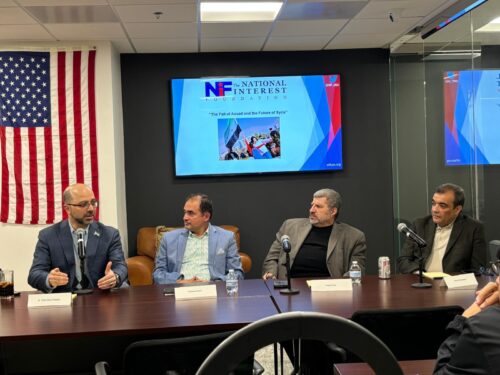
On Tuesday of this week, the National Interest Foundation (NIF) convened a group of experts to discuss the recent toppling of the oppressive Assad regime in Syria, some of the latest developments that have transpired, and what one might expect next. The panel was comprised of: Dr. Tarek Abou Ghazala of the American Coalition for Syria; Radwan Ziadeh of the Damascus Center for Human Rights Studies; Syrian-American activist Raghid Okla; and Bassam Barabandi of People Demand Change. The event was moderated by Khaled Saffuri of the National Interest Foundation. Mr. Saffuri opened the event by remarking how it was a pleasant change to be discussing and celebrating a positive development like the freedom of the Syrian people from an autocratic regime, since far too often in the preceding years, we have seen clampdowns on freedom and democracy in places such as Tunisia and elsewhere around the Arab world. He stated that he would be opening the floor to Dr. Tarek Abou Ghazala to speak first due to the fact that Dr. Abou Ghazala was in Syria when the recent events unfolded and could therefore provide an insightful perspective as to what took place. Before doing so, Khaled emphasized that the focus now should be on how the Syrian uprising can ultimately succeed so that things do not play out the way that they did in Egypt, Libya, and Tunisia.
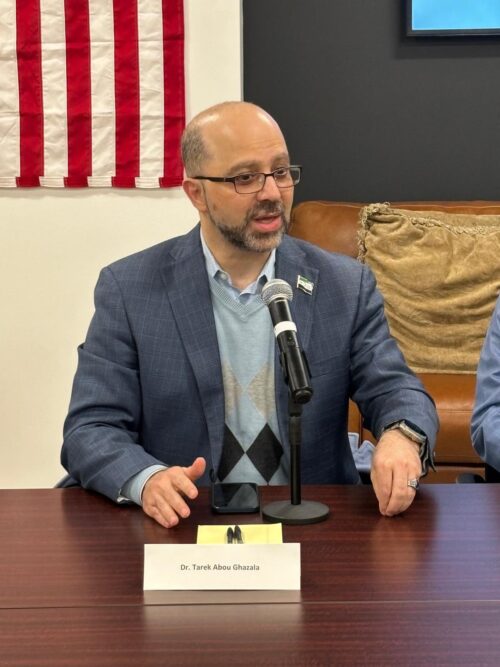
Dr. Abou Ghazala spoke about his arrival in Syria on Sunday, November 24th as part of a medical campaign on behalf of the Syrian American Medical Society. He discussed the power outage which took place in Idlib while he spent time working in a hospital there – which was said to have been the first time that the power had been cut for the entirety of the city in people’s lifetime. Dr. Abou Ghazala recounted how the Syrian opposition’s military offensive unfolded over the coming days and his first-hand experience of being in the country during that time. He concluded that following the successful ousting of the Assad regime, now at this time, the challenging task of governance lies ahead for the Syrian people. Ultimately, it is his hope that what happened in Syria ends up being one of the most important and consequential events to take place in the region during the course of the 21st century.
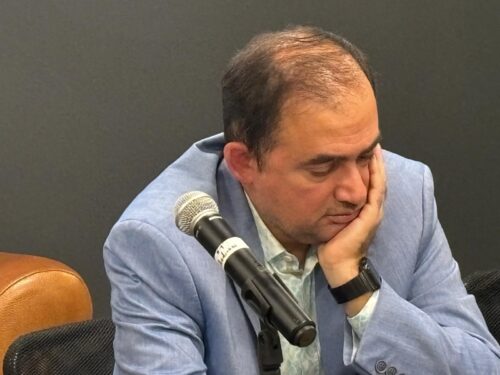
Mr. Radwan Ziadeh talked about some of the main factors that led to such a swift collapse of the Assad regime in Syria in an only 11-day period of time. A couple of these have to do with international and regional alliances, and the others relate to local factors. One of the most notable elements had to do with the lack of Russian intervention in support of Assad this time around due to its preoccupation with the War in Ukraine, which had significantly weakened the Russian Air Force. Ziadeh pointed out that the air cover and capabilities that Russia was able to provide the Assad regime were heavily reduced in 2024, compared to what it was back in September of 2015 for example. Another key factor was the reduction of Iranian-backed militias in support of the Assad regime after 2020. By the year 2020, Assad had been able to regain control of most of Syria with support from Russia, Iran, and groups like Hezbollah. These entities were instrumental in upholding the Assad regime previously, but entanglements in Lebanon, Gaza, and Ukraine meant that they were not able to provide the same level of support to the Syrian regime, which was a major contributor to its downfall. Mr. Ziadeh also touched on how the Syrian regime did not have the resources or capacity to finance its army as another noteworthy factor that played a major role in bringing down the regime within 11 days. Ziadeh spoke about the whereabouts of Bashar al-Assad during the course of the opposition’s military offensive too, and discussed there being an important distinction between a mere successful revolution to overthrow a dictatorial regime vs. one which then leads to a democratic transition and transformation on top of that. As such, among the Syrian people, there is of course a real fear that what happened in Libya might transpire in Syria where the ousting of a dictator ultimately paves the way for in-fighting and challenges in governance. However, Ziadeh expressed that he was optimistic because Syrians have lived through 13 years of war and are exhausted from this, meaning that public opinion will hopefully not allow for any form of internal fighting between domestic entities while the priority lies in trying to build a unified Syria.
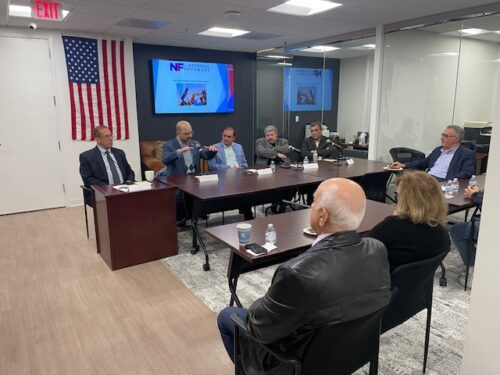
Next, Mr. Raghid Okla touched on how Bashar al-Assad’s relationship and dealings with Iran differed from that of his predecessor and father, Hafez al-Assad. He spoke about Turkey’s role as an important player in Syrian affairs today, and agreed with the notion that Syria is a pluralistic country in every sense of the word and thus presents significant governance challenges. Mr. Okla expressed his hope that Syria would not become the spearhead of Turkish President Recep Tayyip ErdoÄŸan’s political Islam project because this is what brought down the revolution in Egypt and in Libya. He concluded by stressing that he does not concern himself with what countries like Qatar, Saudi Arabia, the United Arab Emirates, and Turkey want with Syria, and instead, is most focused on and cares about what Syrians themselves want their country to be. Lastly, Mr. Bassam Barabandi spoke briefly about his hope that Syrian opposition leader Ahmed al-Sharaa would create an inclusive government that will incorporate Syrians of all backgrounds. For him, the challenge for Syria lies in the fact that there is very little known about Ahmed al-Sharaa and what direction he will take the country, which will determine whether or not it opens up to welcome Syrians who have been displaced or living in exile all over the world.
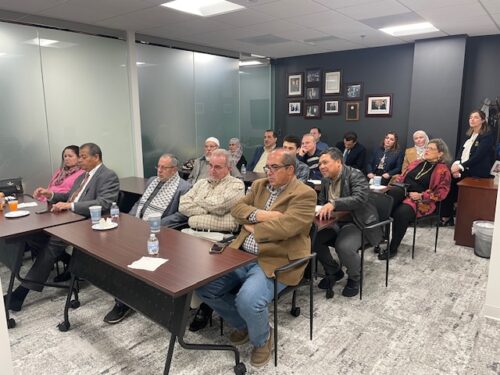
During the Q&A session, one attendee emphasized the importance of Syrian-Americans, Syrian-Europeans, and other members of the Syrian diaspora offering themselves as resources to help build the country back up after decades of living under an oppressive regime. A couple of the speakers agreed, and stressed that all they want is to see that Syria is on the right track moving forward. Another attendee concurred with the belief expressed by the panelists that the road ahead and next stage for Syria will be very challenging, and contended that it will likely be even more difficult than in Libya and in Yemen – given Syria’s strategic location among other countries in the region. Due to this, countries will try to intervene in Syrian affairs, and many not in positive ways but in negative and harmful ones. Thus, as was brought up as a critical point in the midst of the Q&A session, one of the main challenges will be to try and unite the Syrian people – including both secularists and supporters of political Islam – during a very limited period of time in order to attempt to stave off external meddling in domestic Syrian affairs.
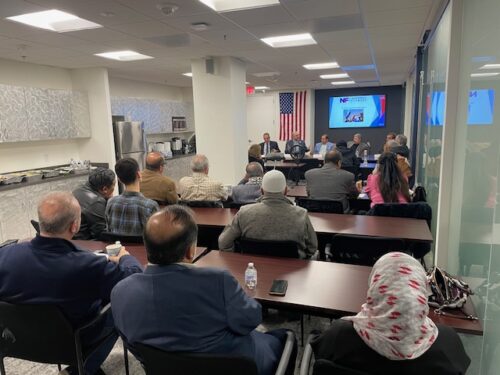
One of the panelists, Mr. Raghid Okla, underlined that what Syrians want now more than anything else in the aftermath of the toppling of an oppressive regime is to live freely – using the specific example of one leaving their house in the morning to go to work and being able to return home without being stopped or harassed, or having to worry about the prospect of arbitrary detention in prison at the whim of an entity of the state. This is something that citizens have had to live in fear of for years under the oppressive rule of Bashar al-Assad and his father before him. Ultimately, one of the most important things is that Syria is not ruled by a single party or political entity, as it has been for the preceding decades. A few other final points were brought up to conclude the event, including another panelist’s belief that a major challenge that lies ahead now in Syria is the need for economic and social reconstruction. It was also noted that for democracy to legitimately take shape, there needs to be the building up of trust in the strength and durability of institutions themselves as opposed to trust in an individual politician, as the latter can exploit a system that lacks robust mechanisms for safeguarding democratic governance.
To watch the entire event on our YouTube page, please click here.
